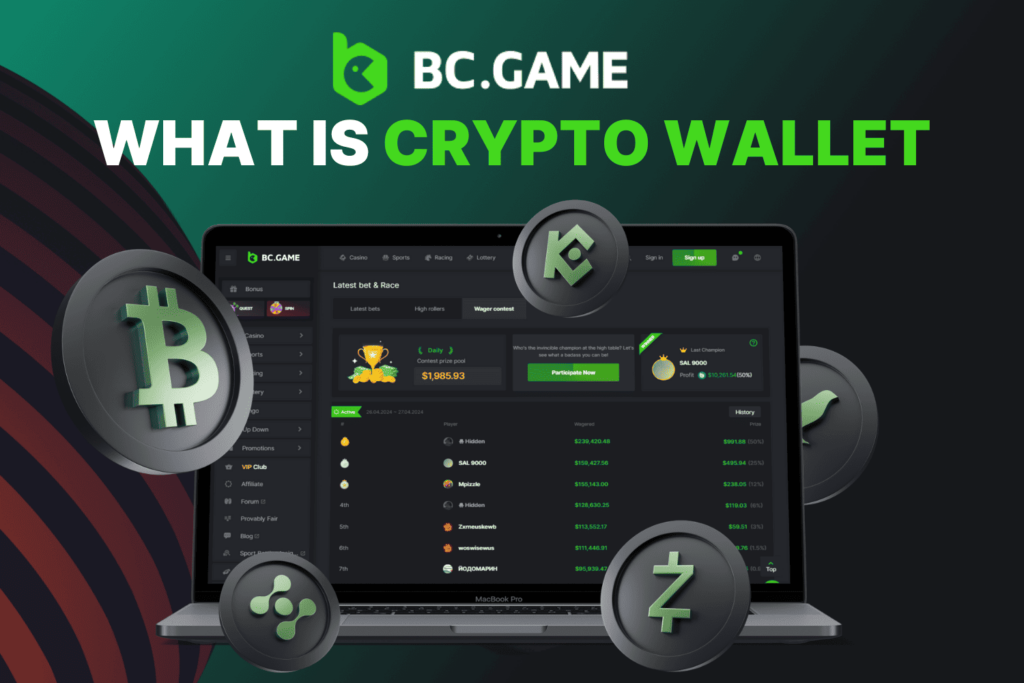
Picture a digital wallet that holds all your money—these aren’t traditional coins but instead an entirely new type of currency designed along with corresponding codes that represent it cryptographically in code: Physic. Using these codes to understand a brand-new digital currency could go some way to explaining what we mean by “crypto wallet.” That is where your cryptocurrency wallet comes in handy. But what exactly is a crypto wallet? How do crypto wallets operate, and why are they so necessary? Let us figure it out together.
What is a Crypto Wallet?
A crypto wallet is a gateway to cryptocurrencies. Say you have a bank account, for example. There are both an account number (your public key) you can hand out to others so they can remit you money and then there is a secret access code—your password or PIN (private key). Your crypto wallet contains these private keys, which are crucial to protecting your digital assets.
A cryptocurrency wallet does not actually hold your coins—as a traditional wallet might. Rather, it stores the keys that grant you access to your cryptocurrency on the blockchain. In this sense, a crypto wallet is a tool for managing your digital assets. But the coins themselves stay on the blockchain where they belong.
Types of Cryptocurrency Wallets
Seeing now what a crypto wallet is, let’s get into something else: the variety of crypto currency wallet types. Choosing the right wallet for cryptocurrency is like deciding whether to carry cash or use credit cards and cheques. They all have their limits; it’s all just a question of the constraints. Depending on who/how much you expect to receive from them will determine which kind best suits your needs.
A paper wallet is one of the most secure ways to store cryptocurrencies, particularly over the long term. How does it work? You write your keys down on a piece of paper, and put it away somewhere safe. It’s like writing out your PIN and account number on paper then locking them away in a safe.
A paper wallet is highly secure because it is completely offline, thus not subject to any online attacks. But if you lose or damage the paper, your access to your investment disappears forever. It’s like losing the key to your home where all of your life savings are kept.
A hardware wallet is like a digital safe: except it comes in the form of typically USB devices that hold your private keys used by digital currency wallet systems. In order to make a transaction, you connect the device to your computer or laptop and key in a PIN. After that, if required for an extra level of security, approve the transaction. Wallets for crypto of this type are available in a number of brands or models. Some of the more popular ones are Ledger Nano S and Trezor. These offer high security because the keys are never connected directly to the internet. However, hardware wallets are expensive and take practice to use well. They represent an effective compromise for people with large quantities of cryptocurrency who want to armour themselves well.
Online wallets, also known as hot wallets, are easy for anyone to use as a way of carrying their currency. These may be web-based, mobile apps, or desktop software. Online wallets allow you to use your cryptocurrency quickly whenever need arises and wherever you are.
But it is often accompanied by danger. They’re online so online wallets are also more open to hacking. Think of it as a little like taking a wallet of notes to the market—fast and easy to access, but keep your wits about you! For this is the place likened by many authors as being full of chicanery and danger. Choose a wallet for crypto from a reputable provider. To keep risks at bay, always activate two-factor authentication.
Crypto Wallet Comparison Table
| Type | Security | Ease of Use | Cost | Most Suitable For |
|---|---|---|---|---|
| Paper Wallet | Super High (Offline and unhackable) | Low (Manual transmission) | Extremely low (cost of paper) | Storage long term, need high security |
| Hardware Wallet | High (Offline, protected by PIN) | Middle (Setup required) | Expensive ($50-200) | Storage of valuables, with a good amount of cryptos |
| Online Wallet | General (connected to the internet) | High (Good to use, quick to access) | Low to Free | Daily usage, trading activity |
How to Use a Wallet
Now that you own a wallet, what should you do next? Well first, let’s see how to use it.
If you are a newbie, then an online wallet might be your best bet to start with. But if you’re holding significant amounts of various cryptocurrencies or are an experienced user, a hardware wallet is better.
When you get a new wallet and everything is working, you also have to put some capital in it. There are two main ways to do this: use one of the platforms to buy your cryptocurrency first then send it to its public address, or alternatively download an app that allows you to trade between different currencies without needing any bank account.
For instance, cryptocurrency can be converted into different forms and put into issuing address. To transfer cryptocurrency, you need the receiving side’s requesting address. After that, the accounts at both ends should be entered in order for small payments. This is like taking money out of one bank account and putting it into another one or vice versa.
Make sure that your wallet for cryptocurrency is always backed up. In general, as long as you write down your seed phrase—the backup key to a safe—then you won’t need any sort of help. The loss or theft of all the world’s local currencies, from penniless to splendiferous dollar equivalents, will have its assets still returned using this backup.
Are Crypto Wallets Safe?
The security of your digital crypto wallet largely hangs on how you employ it. As a rule, offline wallets—such as paper and hardware—tend to be somewhat safer due to their lack of internet connection. That makes them less susceptible to hacking; they still face risks from physical threats like theft, being lost, or broken.
In recent years, not least due to the proliferation of security incidents within the cryptocurrency market, the number is increasing. An example: in 2022 alone, over US$3 billion worth of cryptocurrency was stolen in more than 200 hacking incidents. This makes clear how important it is to secure digital assets with the right types of crypto wallets.
Research shows that:
- 70% of all cryptocurrency thefts are due to hot wallets (online wallets) constantly being connected to the internet.
- Cold wallets (hardware and paper wallets) account for less than 10% of all security breaches, underscoring their robust security.
- Although online wallets are convenient, they come with increased risk. To make them more secure, always use two-factor authentication and regularly update passwords. If you need extra security, consider a multi-signature (multisig) wallet, in which transactions require multiple signatures. This is similar to having a safe that requires many keys to open, making it harder for outsiders to access your funds.
It is also very important to understand custodial versus non-custodial wallets. Custodial wallets are wallets managed by third parties such as exchanges, where you give them your keys and trust that they will keep them safe for you. On the other hand, non-custodial wallets give the user absolute control over their keys, which means that seeing as how this is more difficult, you take on more responsibility with its handling. But in turn, it also provides greater autonomy over your own assets as well.
The Bottom Line
Crypto wallets are indispensable tools in the realm of cryptocurrency. They can provide reassurance that your digital assets—three of which were mentioned here—are securely kept, sent out, and received. You ought to know what kind of wallet suits your needs best by understanding the difference between paper, hardware, and online wallets.
Although crypto wallets may be secure in themselves, people must ensure that they are being used properly and well-protected. Whichever type of wallet you choose—offline security like paper or hardware wallets or convenience with such financial networks as those provided online; adherence to standard practices is essential in managing wallets. Remember, if you do not hold the private keys then the currency they correspond to is not truly yours.
FAQ
Hot wallets are connected onlinvia websites or applications stored on one’s computer. They offer the convenience of frequent use but also pose security risks, depending on how secure your device is. Cold wallets, on the other hand, are offline storage media such as hardware or paper wallets that offer additional protection against online attacks.
You first need to choose what kind of crypto wallet you want (online, hardware, or paper). For an online wallet, download the digital crypto wallet software or app from a reputable provider, follow the setup instructions, and securely store your private keys. When it comes to hardware wallets, purchase the device and connect it to your computer or phone, then proceed with setting it up. While generating your keys using a trusted offline tool for a paper wallet, then print and store them securely.
Selecting a crypto wallet depends on the particular needs you have and how often you are prototyping to use it. In the event that you want access to your cryptocurrency for transactions frequently, an online wallet offers its unmatched convenience to be of service this best. However, if security is of greatest importance, particularly for long-term storage, a hardware or paper wallet ought to be in your sights. Factors such as ease of usage, security features, and whether the wallet supports the particular currencies you want to store are all important considerations. To figure out whether or not you need a custodial wallet, where a third party manages and holds on to your private keys for you; think instead of what type you want. A non-custodial wallet allows you full control over your money, and out of the two options, it’s clearly quite superior.





























